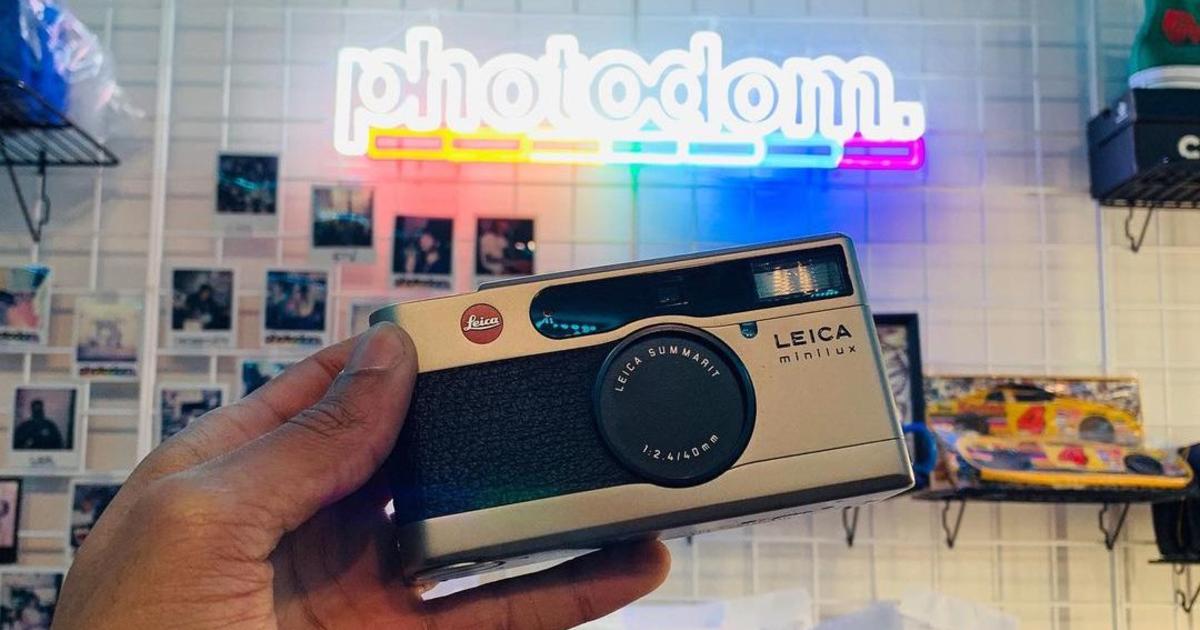Dominick Lewis, a 26-year-old Flatbush resident and photographer, opened his business, Photodom, this fall, claiming to be one of the first Black-owned camera shops in all of Brooklyn. For Lewis, the shop exists as an important part of the city, documenting a community he feels is running out of time.
“I still feel like I have a strong connection to this area because I came up here every single summer growing up. My home I live in now is the same home, my first home, my grandma bought when they first moved to America,” Lewis told CBS News. “I feel like it’s a big, big deal to me with this city being the first connection that we had to America, and it’s changing now, and I feel like I need to be here to document it because if I don’t, who will?”
The store, which is located on the third floor of a multi-use walkup, under the shadow of Brooklyn’s J train, could easily be overlooked. But the support and love from the community aren’t just apparent on social media — it’s literally pasted on the walls. A large section is dedicated to magazines and photos from people who have stopped there. “I don’t want it to be a store that’s just owning my stuff,” said Lewis.
“I want it to also be a store for the community because as photographers, we don’t really get our work showcased unless it’s us promoting it. I feel like these local stores should be doing a better job at that, especially given the fact that I have an audience for things like that.”
https://www.instagram.com/p/CFCou56AUO0/?utm_source=ig_embed&utm_campaign=loading
At 18, Lewis bought his first “real” camera as a graduation present to himself. After dropping out of engineering school to pursue photography, he encountered several setbacks, such as failing with his first photography business and feeling bias from other photographers. But he said each experience helped him build Photodom into what it is now. “Photography is not so much, more known in communities like ours because they’re usually not as affluent or not able to afford certain things like cameras, especially when it’s very expensive,” said Lewis. “Photodom exists to bridge that gap, building a togetherness that uses art to sustain the community.”
Dominick Lewis
And it’s clear the community supports his mission. When Lewis created a GoFundMe to raise money for the store in July, support poured in. Nayllah Noah, a returning customer, said she first visited the shop the week it opened. “My friend sent me a Twitter thread with them in it,” Noah said. She waited in line “for over an hour” but loved how “nice” everyone was and how affordable the cameras are.
The shop recently announced the Photodom Grant Program, where every month, artists can apply for $1,000 in grant money to go towards a project they want to create. Lewis hopes to eventually host photography classes, where beginners can learn the basics for free. “At the end of the day, photographers aren’t known,” said Lewis. “Their photographs are. If I can have a connection to the people who are actually taking those photographs, it’s a lot deeper.”
“I think my favorite thing about this is that it’s all for the community”, said Christa Miranda, a friend of Lewis and worker at the shop. “We are doing this for the community, by the community, because all too often, like other people have to document our stories, and it’s just because we don’t have the resources to do it ourselves.”
An image taken at a protest in New York City.
Dominick Lewis
For a year already marked by tragedy, the nationwide Black Lives Matter protests brought an important but uncomfortable job to Black artists. The movement lived on the photos people captured during protests. For Lewis, the entire process was “anxiety-inducing,” even more so as people began to show more enthusiasm for Black work that centered the protests, to the exclusion of anything else. “I don’t wanna to just be known for protest photos because I feel like that happens sometimes with artists,” said Lewis. “Especially Black artists, where we’re kind of locked inside Black trauma and that trauma is the only way we can tell our stories. It can feel like if we don’t post stuff like that, and we don’t make work like that, no one really cares about us, otherwise. I don’t wanna be stuck in that type of category.”
As a photographer, Lewis prefers to spend his time documenting the in-between, everyday moments of life. “I started a project called ‘Document Brooklyn,'” said Lewis. “My main focus of the project was to tell the side of Brooklyn that’s not really seen in pretty magazines and things like that, especially in the neighborhood that I live in.”
Before Photodom opened, Lewis said residents told him the building had previously been used for everything from housing to a nightclub. “That’s why I’m glad that I’m in a space like this,” said Lewis. ” I think it’s very important that we have some type of establishment or foothold in the community, even if it will change around it.”
